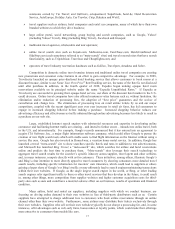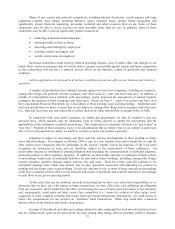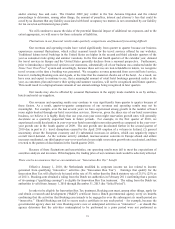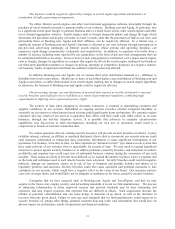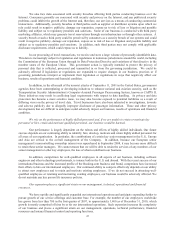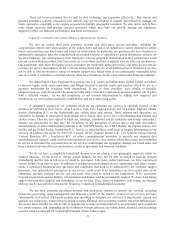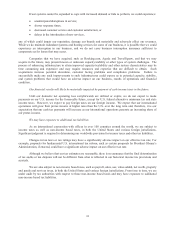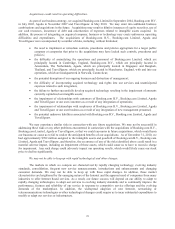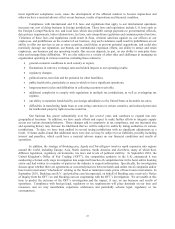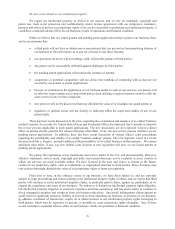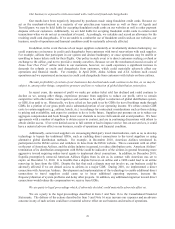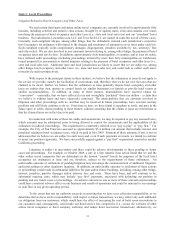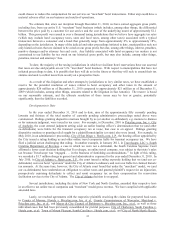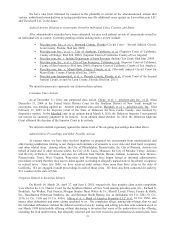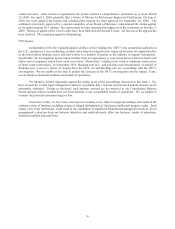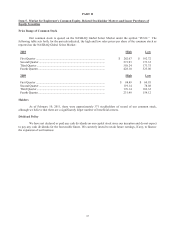Priceline 2010 Annual Report Download - page 101
Download and view the complete annual report
Please find page 101 of the 2010 Priceline annual report below. You can navigate through the pages in the report by either clicking on the pages listed below, or by using the keyword search tool below to find specific information within the annual report.27
incur significant compliance costs, cause the development of the affected markets to become impractical and
otherwise have a material adverse effect on our business, results of operations and financial condition.
Compliance with international and U.S. laws and regulations that apply to our international operations
increases our cost of doing business in foreign jurisdictions. These laws and regulations include U.S. laws such as
the Foreign Corrupt Practices Act, and local laws which also prohibit corrupt payments to governmental officials,
data privacy requirements, labor relations laws, tax laws, anti-competition regulations and consumer protection laws.
Violations of these laws and regulations could result in fines, criminal sanctions against us, our officers or our
employees, and prohibitions on the conduct of our business. Any such violations could result in prohibitions on our
ability to offer our services in one or more countries, could delay or prevent potential acquisitions, and could also
materially damage our reputation, our brands, our international expansion efforts, our ability to attract and retain
employees, our business and our operating results. Our success depends, in part, on our ability to anticipate these
risks and manage these difficulties. We are also subject to a variety of other risks and challenges in managing an
organization operating in various countries, including those related to:
x general economic conditions in each country or region;
x fluctuations in currency exchange rates and related impacts to our operating results;
x regulatory changes;
x political unrest, terrorism and the potential for other hostilities;
x public health risks, particularly in areas in which we have significant operations;
x longer payment cycles and difficulties in collecting accounts receivable;
x additional complexity to comply with regulations in multiple tax jurisdictions, as well as overlapping tax
regimes;
x our ability to repatriate funds held by our foreign subsidiaries to the United States at favorable tax rates;
x difficulties in transferring funds from or converting currencies in certain countries; and reduced protection
for intellectual property rights in some countries.
Our business has grown substantially over the last several years and continues to expand into new
geographical locations. In addition, we have made efforts and expect to make further efforts to integrate supply
across our various demand platforms. These changes add to complexity in tax compliance, and our increased size
and operating history may increase the likelihood that we will be subject to audits by taxing authorities in various
jurisdictions. To date, we have been audited in several taxing jurisdictions with no significant adjustments as a
result. If future audits found that additional taxes were due, we may be subject to tax liabilities, possibly including
interest and penalties, which could have a material adverse impact on our financial conditions and results of
operations.
In addition, the strategy of Booking.com, Agoda and TravelJigsaw involves rapid expansion into regions
around the world, including Europe, Asia, North America, South America and elsewhere, many of which have
different legislation, regulatory environments, tax laws and levels of political stability. In September 2010, the
United Kingdom’s Office of Fair Trading (“OFT”), the competition authority in the U.K., announced it was
conducting a formal early stage investigation into suspected breaches of competition law in the hotel online booking
sector and had written to a number of parties in the industry to request information. Specifically, the investigation
focuses upon whether there are agreements or concerted practices between hotels and online travel companies and/or
hotel room reservation “wholesalers” relating to the fixed or minimum resale prices of hotel room reservations. In
September 2010, Booking.com B.V. and priceline.com Incorporated, on behalf of Booking.com, received a Notice
of Inquiry from the OFT; we and Booking.com are cooperating with the OFT’s investigation. We are unable at this
time to predict the outcome of the OFT’s investigation and the impact, if any, on our business and results of
operations. Compliance with foreign legal, regulatory or tax requirements will place demands on our time and
resources, and we may nonetheless experience unforeseen and potentially adverse legal, regulatory or tax
consequences.


